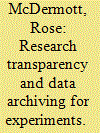| Srl | Item |
| 1 |
ID:
116821


|
|
|
|
|
| Publication |
2012.
|
| Summary/Abstract |
History is omnipresent in the natural world, from inside rocks on the continents to the genes, cells, and organs of each creature on the planet. Linking the historical records of rocks, fossils, and genes has been a boon to understanding the major events in evolution. We use these seemingly different lines of evidence as tools for discovery: analyses of genes can predict likely places to find fossils, and new fossils can provide the means to interpret insights from genetics. Viewed in this way, every living thing on Earth is the extreme tip of a deeply branched tree of life that extends three billion years into the past. Genes and fossils reveal how deeply connected our species is to the rest of the living world and the planet itself.
|
|
|
|
|
|
|
|
|
|
|
|
|
|
|
|
| 2 |
ID:
131533


|
|
|
|
|
| Publication |
2014.
|
| Summary/Abstract |
Although still more common in medical studies and some other areas of social science such as psychology and behavioral economics, experimental work has become an increasingly important methodology in political science. Experimental work differs from other kinds of research because it systematically administers a specific treatment to part of a population while withholding that manipulation from the rest of a subject pool. The best studies strive to keep all other aspects of the experiment similar, so that any emergent difference between the treatment and control group that emerge provide unparalleled traction in determining causal inference. Many other valuable forms of social research use observation of the natural world, rather than depending on intervention to advance understanding. Because experimentalists can create the environment or process they want to study, this strategy of intervention and manipulation constitutes the main distinction between experimental work and other forms of social observation.
|
|
|
|
|
|
|
|
|
|
|
|
|
|
|
|